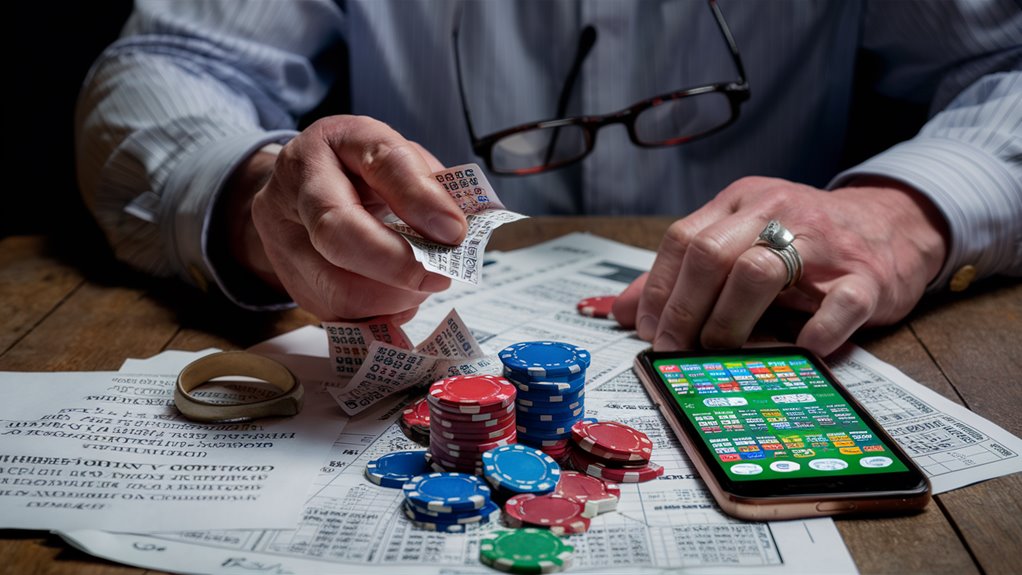
Recognizing Early Warning Signs of Problem Gambling
Understanding the Transition from Casual Gaming to Addiction
Problem gambling often begins subtly, transforming from casual entertainment into a destructive behavioral pattern. Early detection and intervention are crucial for preventing severe consequences and maintaining personal wellbeing.
Key Warning Signs of Gambling Harm
Financial Indicators
- Escalating bet amounts 먹튀커뮤니티 despite mounting losses
- Multiple ATM withdrawals near gaming venues
- Maxed-out credit cards and depleted savings
- Secret financial transactions and hidden accounts
- Frequent borrowing from family and friends
Behavioral Changes
- Mood fluctuations corresponding to wins and losses
- Social withdrawal from family and friends
- Increased secrecy about gambling activities
- Work performance decline and missed appointments
- Defensive reactions to concerned inquiries
Psychological Patterns
- Persistent preoccupation with gambling strategies
- Rationalization of betting behavior
- Escape-focused gambling to avoid problems
- Loss of control over time spent gambling
- Chasing losses with larger bets
Q&A: Understanding Gambling Harm
Q: What distinguishes casual gambling from problematic behavior?
A: Casual gambling maintains financial limits and doesn’t interfere with daily responsibilities, while problematic gambling shows loss of control and escalating negative consequences.
Q: How quickly can gambling become addictive?
A: The progression varies individually but can accelerate rapidly when combined with stress, financial pressure, or underlying mental health issues.
Q: What are the most reliable early warning signs?
A: Financial secrecy, increasing bet sizes, and defensive behavior about gambling activities are typically the earliest reliable indicators.
Q: Does winning big increase addiction risk?
A: Yes, large early wins can create unrealistic expectations and reinforce continued gambling despite subsequent losses.
Q: Can someone be addicted without gambling daily?
A: Yes, addiction is characterized by impact on 진행형 베팅 life quality and loss of control, not necessarily frequency of play.
Intervention Strategies
- Document gambling patterns and financial impacts
- Seek professional guidance from addiction specialists
- Implement financial safeguards and account restrictions
- Build support networks with family and counselors
- Address underlying triggers and stressors
Recognizing the Warning Signs

Recognizing Problem Gambling Warning Signs: A Comprehensive Guide
Early Warning Signs and Behavioral Indicators
Problem gambling manifests through distinct behavioral changes before developing into severe addiction.
The earliest warning indicators typically emerge in financial management patterns and time allocation.
Key red flags include frequent borrowing, selling personal possessions, and deceptive behavior regarding whereabouts or activities.
Critical Behavioral Patterns
Problematic gambling behavior often presents through specific patterns:
- Escalating bet sizes to maintain excitement levels
- Loss-chasing behavior through increased gambling activity
- Neglect of professional and family obligations
- Withdrawal symptoms including restlessness and irritability
- Social isolation and relationship deterioration
- Intense preoccupation with gambling activities
Financial Warning Signs
Financial distress indicators serve as crucial markers of gambling-related harm:
- Maxed-out credit cards and depleted savings accounts
- Hidden financial statements and concealed banking activity
- Unexplained debt accumulation
- Emergency loan requests
- Asset liquidation for gambling funds
#
Frequently Asked Questions
Q: What’re the earliest signs of problem gambling?
A: Initial signs include irregular financial patterns, secretive behavior, and increased time spent gambling.
Q: How does problem gambling affect relationships?
A: Problem gambling typically leads to social withdrawal, damaged trust, and strained family connections.
Q: What financial behaviors indicate gambling addiction?
A: Key indicators include depleted savings, maxed credit cards, hidden statements, and frequent borrowing.
Q: Can problem gambling be identified through emotional changes?
A: Yes, watch for mood swings, irritability when not gambling, and anxiety about financial matters.
Q: What distinguishes recreational from problem gambling?
A: Problem gambling involves loss of control, escalating bets, and negative impact on daily life responsibilities.
Financial Red Flags
Financial Warning Signs of Problem Gambling
Key Financial Red Flags
Unexplained account activity and suspicious banking patterns serve as critical indicators of problematic gambling behavior.
Multiple ATM withdrawals near gaming establishments, maxed-out credit lines, and frequent cash advances represent clear warning signals that require immediate attention.
Banking and Credit Patterns
Problematic financial behaviors typically manifest through:
- Unexplained withdrawals from savings accounts
- Multiple credit card cash advances
- Frequent ATM transactions near gambling venues
- Online payments to betting platforms
- Hidden bank accounts and statements
Asset Management Concerns
High-risk financial decisions often emerge when gambling addiction takes hold. Watch for:
- Asset refinancing activities
- Early retirement account withdrawals
- Second mortgage applications
- Sale of valuable possessions
- Payday loan applications
Common Questions About Gambling Financial Red Flags
FAQ
Q: What’re the earliest financial signs of problem gambling?
A: Early indicators include unexplained cash withdrawals, maxed credit cards, and frequent borrowing from friends or family.
Q: How do problem gamblers typically hide their financial activities?
A: They often maintain secret accounts, intercept bank statements, and use multiple credit cards to conceal transactions.
Q: Can financial monitoring help prevent gambling addiction?
A: Regular account monitoring can identify problematic patterns early, enabling faster intervention and support.
Q: What banking transactions indicate potential gambling issues?
A: Multiple ATM withdrawals near casinos, repeated online payments to betting sites, and frequent cash advances are key indicators.
Q: What financial behaviors suggest severe gambling problems?
A: Liquidating assets, taking payday loans, refinancing property, and depleting retirement accounts indicate severe gambling issues.
Impact on Personal Relationships

The Impact of Gambling Addiction on Personal Relationships
Gambling addiction systematically erodes the foundation of personal relationships, creating devastating rifts between individuals and their support networks.
Relationship deterioration commonly manifests through patterns of deception, emotional distance, and severe breaches of trust.
Warning Signs of Relationship Damage
Key indicators of gambling-related relationship strain include:
- Frequent absences from family events and social gatherings
- Defensive behavior when confronted about gambling activities
- Social withdrawal and increased isolation
- Deceptive communication about whereabouts and activities
Financial Deception and Trust
Financial dishonesty represents one of the most damaging aspects of gambling addiction on relationships.
Trust violations occur through:
- Unauthorized borrowing from family members
- Hidden debt accumulation
- Misappropriation of shared resources
- Concealment of financial difficulties
Impact on Family Dynamics
Family disruption becomes evident through:
- Missed milestones in children’s lives
- Neglected partnerships and marital strain
- Abandoned family obligations
- Emotional trauma affecting multiple generations
Frequently Asked Questions
Q: How does gambling addiction affect children?
A: Children often experience emotional neglect, financial instability, and developmental challenges due to a parent’s gambling addiction.
Q: Can relationships recover from gambling addiction?
A: Recovery is possible with professional intervention, commitment to treatment, and rebuilding trust through consistent actions.
Q: What’re the first signs of relationship damage?
A: Early warning signs include increased secrecy, unexplained absences, financial inconsistencies, and emotional withdrawal.
Q: How can family members protect themselves?
A: Family members should establish clear boundaries, seek support groups, and maintain separate financial accounts.
Q: What professional help is available for affected relationships?
A: Options include family therapy, addiction counseling, financial advisors, and support groups for both gamblers and loved ones.
Breaking the Denial Barrier
Breaking the Gambling Denial Barrier: Recognition and Recovery
Understanding Gambling Denial
Denial in gambling addiction represents one of the most significant psychological barriers to recovery.
Problem gamblers often engage in complex rationalization patterns, convincing themselves they maintain control through thoughts like “it’s just entertainment” or “I can quit whenever I choose.”
This self-deceptive behavior creates a protective shield against acknowledging the developing addiction patterns.
Breaking Through Self-Deception
Financial Reality Check
Conducting a comprehensive financial audit serves as the first step in breaking denial.
Track every gambling transaction meticulously over a two-week period, including both wins and losses. Raw financial data provides concrete evidence that challenges entrenched denial mechanisms.
Time Impact Analysis
Document gambling activities versus essential life commitments:
- Work hours missed
- Sleep patterns disrupted
- Family time sacrificed
- Social obligations neglected
Warning Signs and Red Flags
Critical indicators of problematic gambling include:
- Secretive behavior around gambling activities
- Financial deception or borrowing for gambling
- Missed commitments and relationship strain
- Escalating bet amounts to chase losses
## Frequently Asked Questions
Q: How do I know if I’m in denial about gambling?
A: Look for signs like hiding gambling activities, minimizing losses, and making excuses for gambling behavior.
Q: What’s the first step to breaking gambling denial?
A: Begin with a detailed financial audit tracking all gambling-related transactions.
Q: Can I overcome gambling addiction without professional help?
A: While possible, professional support significantly increases recovery success rates.
Q: How does denial affect gambling recovery?
A: Denial prevents recognition of the problem and delays seeking necessary treatment.
Q: What role do family members play in breaking denial?
A: Family support can provide crucial feedback and motivation for acknowledging gambling issues.
Steps Toward Recovery

Steps Toward Gambling Recovery: A Comprehensive Guide
Essential First Steps
Professional intervention marks the critical first phase of gambling recovery.
Connecting with a certified gambling counselor enables proper assessment and development of a personalized treatment strategy.
Complete transparency regarding gambling patterns, emotional triggers, and financial consequences creates the foundation for effective treatment.
Implementing Protective Measures
Immediate safeguards are crucial for recovery success. Key protective steps include:
- Digital barriers: Block gambling websites and remove betting applications
- Financial protection: Transfer account control to trusted family members
- Support networks: Regular attendance at Gamblers Anonymous meetings
- Recovery documentation: Track progress and identify triggering situations
Evidence-Based Treatment Approaches
Cognitive Behavioral Therapy (CBT) stands as a cornerstone of successful gambling recovery. This therapeutic approach helps:
- Restructure problematic gambling beliefs
- Develop healthy coping mechanisms
- Create sustainable behavior modifications
- Establish clear recovery milestones
Recovery Management Strategies
Strategic planning enhances recovery outcomes through:
- Systematic debt repayment schedules
- Lifestyle modification programs
- Trigger management protocols
- High-risk situation action plans
Frequently Asked Questions
Q: How long does gambling recovery typically take?
A: Recovery timeframes vary individually, but initial intensive treatment typically spans 3-6 months.
Q: What role does family support play in recovery?
A: Family support is crucial, providing emotional backing and practical assistance with financial management.
Q: Can gambling addiction be treated without professional help?
A: While self-help methods exist, professional treatment significantly increases recovery success rates.
Q: What’re common relapse triggers?
A: Common triggers include financial stress, emotional distress, and exposure to gambling environments.
Q: How effective is CBT in treating gambling addiction?
A: Research shows CBT is highly effective, with success rates of 60-70% when combined with support groups.
